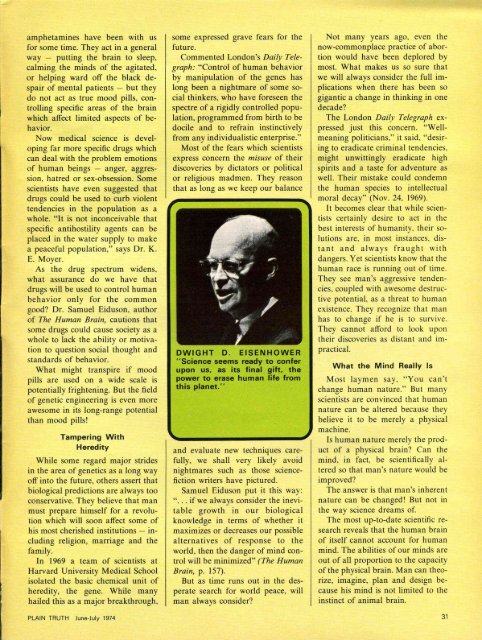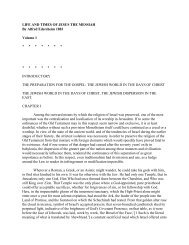Create successful ePaper yourself
Turn your PDF publications into a flip-book with our unique Google optimized e-Paper software.
amphetamines have been with us<br />
for some time. They act in a general<br />
way - putting the brain to sleep,<br />
calming the minds of the agitated,<br />
or helping ward off the black despair<br />
of mental patients - but they<br />
do not act as true mood pills, controlling<br />
specific areas of the brain<br />
which affect limited aspects of behavior.<br />
Now medical science is developing<br />
far more specific drugs which<br />
can deal with the problem emotions<br />
of human beings - anger, aggression,<br />
hatred or sex-obsession. Some<br />
scientists have even suggested that<br />
drugs could be used to curb violent<br />
tendencies in the population as a<br />
whole. "It is not inconceivable that<br />
specific antihostility agents can be<br />
placed in the water supply to make<br />
a peaceful population," says Dr. K.<br />
E. Moyer.<br />
As the drug spectrum widens,<br />
what assurance do we have that<br />
drugs will be used to control human<br />
behavior only for the <strong>com</strong>mon<br />
good? Dr. Samuel Eiduson, author<br />
of The Human Brain, cautions that<br />
some drugs could cause society as a<br />
whole to lack the ability or motivation<br />
to question social thought and<br />
standards of behavior. .<br />
What might transpire if mood<br />
pills are used on a wide scale is<br />
potentially frightening. But the field<br />
of genetic engineering is even more<br />
awesome in its long-range potential<br />
than mood pills!<br />
Tampering With<br />
Heredity<br />
While some regard major strides<br />
in the area of genetics as a long way<br />
off into the future, others assert that<br />
biological predictions are always too<br />
conservative. They believe that man<br />
must prepare himself for a revolution<br />
which will soon affect some of<br />
his most cherished institutions - including<br />
religion, marriage and the<br />
family.<br />
In 1969 a team of scientists at<br />
Harvard University Medical School<br />
isolated the basic chemical unit of<br />
heredity, the gene. While many<br />
hailed this as a major breakthrough,<br />
PLAIN TRUTH June-July 1974<br />
some expressed grave fears for the<br />
future.<br />
Commented London's Daily Telegraph:<br />
"Control of human behavior<br />
by manipulation of the genes has<br />
long been a nightmare of some social<br />
thinkers, who have foreseen the<br />
spectre of a rigidly controlled population,<br />
programmed from birth to be<br />
docile and to refrain instinctively<br />
from any individualistic enterprise."<br />
Most of the fears which scientists<br />
express concern the misuse of their<br />
discoveries by dictators or political<br />
or religious madmen. They reason<br />
that as long as we keep our balance<br />
DWIGHT D. EISENHOWER<br />
"Science seems ready to confer<br />
upon us, as its final gift. the<br />
power to erase human life from<br />
this planet."<br />
and evaluate new techniques carefully,<br />
we shall very likely avoid<br />
nightmares such as those sciencefiction<br />
writers have pictured.<br />
Samuel Eiduson put it this way:<br />
" . .. if we always consider the inevitable<br />
growth in our biological<br />
knowledge in terms of whether it<br />
maximizes or decreases our possible<br />
alternatives of response to the<br />
world, then the danger of mind control<br />
will be minimized" (The Human<br />
Brain, p. 157).<br />
But as time runs out in the desperate<br />
search for world peace, will<br />
man always consider?<br />
Not many years ago, even the<br />
now-<strong>com</strong>monplace practice of abortion<br />
would have been deplored by<br />
most. What makes us so sure that<br />
we will always consider the full implications<br />
when there has been so<br />
gigantic a change in thinking.in one<br />
decade?<br />
The London Daily Telegraph expressed<br />
just this concern. "Wellmeaning<br />
politicians," it said, "desiring<br />
to eradicate criminal tendencies,<br />
might unwittingly eradicate high<br />
spirits and a taste for adventure as<br />
well. Their mistake could condemn<br />
the human species to intellectual<br />
moral decay" (Nov. 24, 1969).<br />
It be<strong>com</strong>es clear that while scientists<br />
certainly desire to act in the<br />
best interests of humanity, their solutions<br />
are, in most instances, distant<br />
and always fraught with<br />
dangers. Yet scientists know that the<br />
human race is running out of time.<br />
They see man's aggressive tendencies,<br />
coupled with awesome destructive<br />
potential, as a threat to human<br />
existence. They recognize that man<br />
has to change if he is to survive.<br />
They cannot afford to look upon<br />
their discoveries as distant and impractical.<br />
What the Mind Really Is<br />
Most laymen say, "You can't<br />
change human nature." But many<br />
scientists are convinced that human<br />
nature can be altered because they<br />
believe it to be merely a physical<br />
machine.<br />
Is human nature merely the product<br />
of a physical brain? Can the<br />
mind, in fact, be scientifically altered<br />
so that man's nature would be<br />
improved?<br />
The answer is that man's inherent<br />
nature can be changed! But not in<br />
the way science dreams of.<br />
The most up-to-date scientific research<br />
reveals that the human brain<br />
of itself cannot account for human<br />
mind. The abilities of our minds are<br />
out of all proportion to the capacity<br />
of the physical brain. Man can theorize,<br />
imagine, plan and design because<br />
his mind is not limited to the<br />
instinct of animal brain.<br />
31












